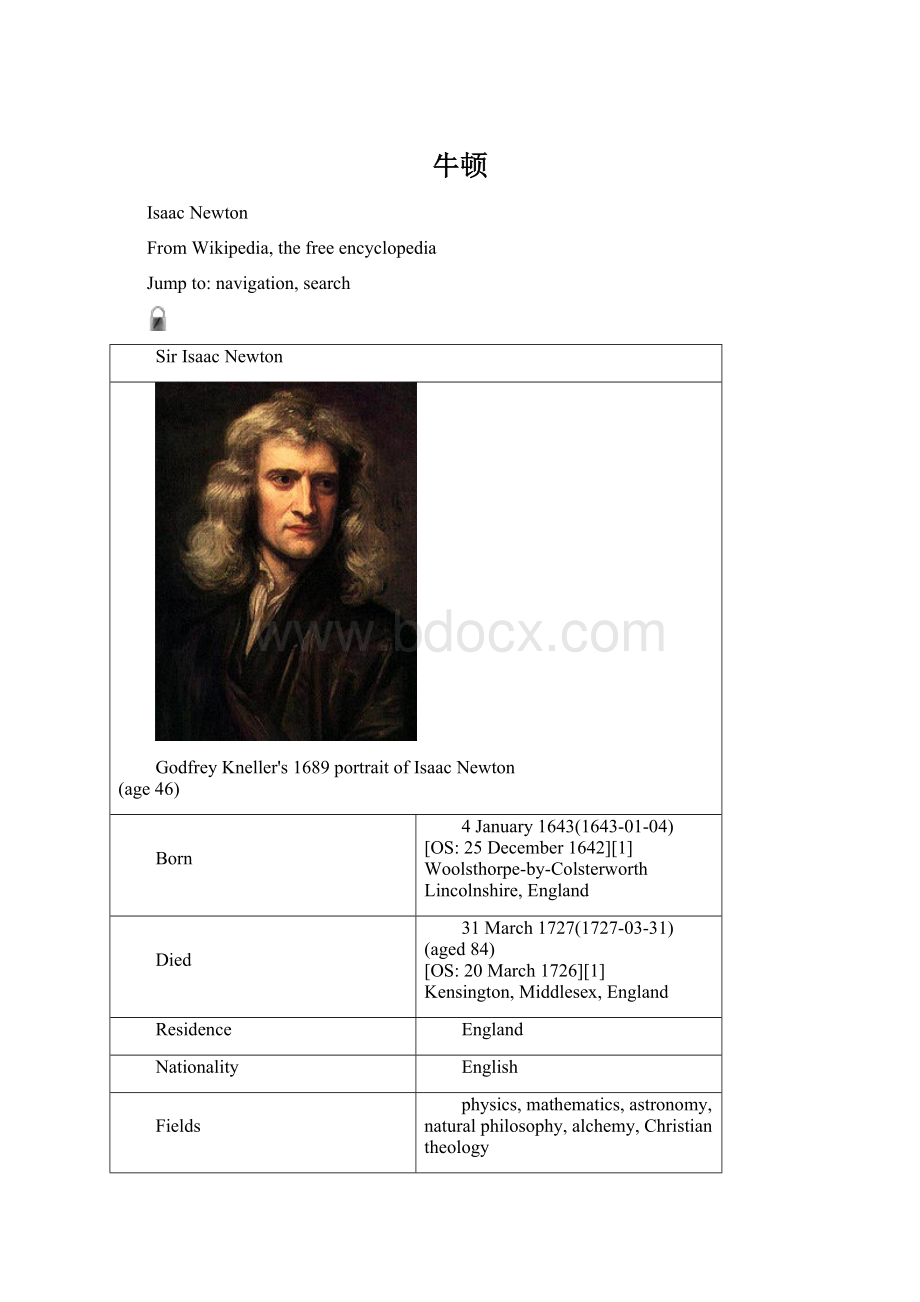牛顿文档格式.docx
《牛顿文档格式.docx》由会员分享,可在线阅读,更多相关《牛顿文档格式.docx(20页珍藏版)》请在冰豆网上搜索。

31March1727(1727-03-31)(aged
84)
20March1726][1]
Kensington,Middlesex,England
Residence
England
Nationality
English
Fields
physics,mathematics,astronomy,naturalphilosophy,alchemy,Christiantheology
Institutions
UniversityofCambridge
RoyalSociety
RoyalMint
Almamater
TrinityCollege,Cambridge
Academicadvisors
IsaacBarrow[2]
BenjaminPulleyn[3][4]
Notablestudents
RogerCotes
WilliamWhiston
Known
for
Newtonianmechanics
Universalgravitation
Infinitesimalcalculus
Optics
Binomialseries
Newton'
smethod
Philosophiæ
NaturalisPrincipiaMathematica
Influences
HenryMore[5]
PolishBrethren[6]
Influenced
NicolasFatiodeDuillier
JohnKeill
Signature
Notes
HismotherwasHannahAyscough.Hishalf-niecewasCatherineBarton.
SirIsaacNewtonFRS(4January1643–31March1727[OS:
25December1642–20March1726])[1]wasanEnglishphysicist,mathematician,astronomer,naturalphilosopher,alchemist,andtheologian,andisconsideredbymanyscholarsandmembersofthegeneralpublictobeoneofthemostinfluentialpeopleinhumanhistory.HisPhilosophiæ
NaturalisPrincipiaMathematica(Latinfor"
MathematicalPrinciplesOfNaturalPhilosophy"
;
usuallycalledthePrincipia),publishedin1687,isprobablythemostimportantscientificbookeverwritten.Itlaysthegroundworkformostofclassicalmechanics.Inthiswork,Newtondescribeduniversalgravitationandthethreelawsofmotion,whichdominatedthescientificviewofthephysicaluniverseforthenextthreecenturies.NewtonshowedthatthemotionsofobjectsonEarthandofcelestialbodiesaregovernedbythesamesetofnaturallaws,bydemonstratingtheconsistencybetweenKepler'
slawsofplanetarymotionandhistheoryofgravitation;
thusremovingthelastdoubtsaboutheliocentrismandadvancingtheScientificRevolution.
Newtonbuiltthefirstpracticalreflectingtelescope[7]anddevelopedatheoryofcolourbasedontheobservationthataprismdecomposeswhitelightintothemanycoloursthatformthevisiblespectrum.Healsoformulatedanempiricallawofcoolingandstudiedthespeedofsound.
Inmathematics,NewtonsharesthecreditwithGottfriedLeibnizforthedevelopmentofdifferentialandintegralcalculus.Healsodemonstratedthegeneralisedbinomialtheorem,developedNewton'
smethodforapproximatingtherootsofafunction,andcontributedtothestudyofpowerseries.
Newtonwasalsohighlyreligious.HewasanunorthodoxChristian,andduringhislifetimeactuallywrotemoreonBiblicalhermeneuticsandoccultstudiesthanonscienceandmathematics,thesubjectsheismainlyassociatedwith.
Contents
[hide]
∙1Life
o1.1Earlylife
o1.2Middleyears
▪1.2.1Mathematics
▪1.2.2Optics
▪1.2.3Mechanicsandgravitation
o1.3Laterlife
o1.4Afterdeath
▪1.4.1Fame
▪1.4.2Commemorations
o1.5Inpopularculture
∙2Religiousviews
o2.1Effectonreligiousthought
o2.2Viewsoftheendoftheworld
∙3Enlightenmentphilosophers
∙4Counterfeiters
∙5Lawsofmotion
∙6Appleanalogy
∙7Writings
∙8Seealso
∙9Footnotesandreferences
∙10References
∙11Furtherreading
o11.1Religion
o11.2Primarysources
∙12Externallinks
o12.1Writingsbyhim
Life
Earlylife
Mainarticle:
EarlylifeofIsaacNewton
IsaacNewtonwasbornon4January1643[OS:
25December1642][1]atWoolsthorpeManorinWoolsthorpe-by-Colsterworth,ahamletinthecountyofLincolnshire.AtthetimeofNewton'
sbirth,EnglandhadnotadoptedtheGregoriancalendarandthereforehisdateofbirthwasrecordedasChristmasDay,25December1642.Newtonwasbornthreemonthsafterthedeathofhisfather,aprosperousfarmeralsonamedIsaacNewton.Bornprematurely,hewasasmallchild;
hismotherHannahAyscoughreportedlysaidthathecouldhavefitinsideaquartmug(≈1.1litres).WhenNewtonwasthree,hismotherremarriedandwenttolivewithhernewhusband,theReverendBarnabusSmith,leavinghersoninthecareofhismaternalgrandmother,MargeryAyscough.TheyoungIsaacdislikedhisstepfatherandheldsomeenmitytowardshismotherformarryinghim,asrevealedbythisentryinalistofsinscommitteduptotheageof19:
"
ThreateningmyfatherandmotherSmithtoburnthemandthehouseoverthem."
[8]WhileNewtonwasonceengagedinhislateteenstoaMissStorey,henevermarried,beinghighlyengrossedinhisstudiesandwork.[9][10][11]
Newtonina1702portraitbyGodfreyKneller
IsaacNewton(Bolton,SarahK.FamousMenofScience.NY:
ThomasY.Crowell&
Co.,1889)
Fromtheageofabouttwelveuntilhewasseventeen,NewtonwaseducatedatTheKing'
sSchool,Grantham(wherehissignaturecanstillbeseenuponalibrarywindowsill).Hewasremovedfromschool,andbyOctober1659,hewastobefoundatWoolsthorpe-by-Colsterworth,wherehismother,widowedbynowforasecondtime,attemptedtomakeafarmerofhim.Hehatedfarming.[12]HenryStokes,masterattheKing'
sSchool,persuadedhismothertosendhimbacktoschoolsothathemightcompletehiseducation.Motivatedpartlybyadesireforrevengeagainstaschoolyardbully,hebecamethetop-rankedstudent.[13]
InJune1661,hewasadmittedtoTrinityCollege,Cambridgeasasizar—asortofwork-studyrole.[14]Atthattime,thecollege'
steachingswerebasedonthoseofAristotle,butNewtonpreferredtoreadthemoreadvancedideasofmodernphilosophers,suchasDescartes,andofastronomerssuchasCopernicus,Galileo,andKepler.In1665,hediscoveredthegeneralisedbinomialtheoremandbegantodevelopamathematicaltheorythatwouldlaterbecomeinfinitesimalcalculus.SoonafterNewtonhadobtainedhisdegreeinAugust1665,theuniversitytemporarilyclosedasaprecautionagainsttheGreatPlague.AlthoughhehadbeenundistinguishedasaCambridgestudent,[15]Newton'
sprivatestudiesathishomeinWoolsthorpeoverthesubsequenttwoyearssawthedevelopmentofhistheoriesoncalculus,opticsandthelawofgravitation.In1667,hereturnedtoCambridgeasafellowofTrinity.[16]Fellowswererequiredtobecomeordainedpriests,somethingNewtondesiredtoavoidduetohisunorthodoxviews.LuckilyforNewton,therewasnospecificdeadlineforordinationanditcouldbepostponedindefinitely.TheproblembecamemoreseverelaterwhenNewtonwaselectedfortheprestigiousLucasianChair.Forsuchasignificantappointment,ordainingnormallycouldnotbedodged.Nevertheless,NewtonmanagedtoavoiditbymeansofaspecialpermissionfromCharlesII(see"
Middleyears"
sectionbelow).
Middleyears
Mathematics
sworkhasbeensaid"
todistinctlyadvanceeverybranchofmathematicsthenstudied"
.[17]
Hisworkonthesubjectusuallyreferredtoasfluxionsorcalculusisseen,forexample,inamanuscriptofOctober1666,nowpublishedamongNewton'
smathematicalpapers.[18]Arelatedsubjectwasinfiniteseries.Newton'
smanuscript"
Deanalysiperaequationesnumeroterminoruminfinitas"
("
Onanalysisbyequationsinfiniteinnumberofterms"
)wassentbyIsaacBarrowtoJohnCollinsinJune1669:
inAugust1669BarrowidentifieditsauthortoCollinsas"
MrNewton,afellowofourCollege,andveryyoung
...butofanextraordinarygeniusandproficiencyinthesethings"
.[19]
NewtonlaterbecameinvolvedinadisputewithLeibnizoverpriorityinthedevelopmentofinfinitesimalcalculus.MostmodernhistoriansbelievethatNewtonandLeibnizdevelopedinfinitesimalcalculusindependently,althoughwithverydifferentnotations.OccasionallyithasbeensuggestedthatNewtonpublishedalmostnothingaboutituntil1693,anddidnotgiveafullaccountuntil1704,whileLeibnizbeganpublishingafullaccountofhismethodsin1684.(Leibniz'
snotationand"
differentialMethod"
nowadaysrecognisedasmuchmoreconvenientnotations,wereadoptedbycontinentalEuropeanmathematicians,andafter1820orso,alsobyBritishmathematicians.)Suchasuggestion,however,failstonoticethecontentofcalculuswhichcriticsofNewton'
stimeandmoderntimeshavepointedoutinBook1ofNewton'
sPrincipiaitself(published1687)andinitsforerunnermanuscripts,suchasDemotucorporumingyrum("
Onthemotionofbodiesinorbit"
),of1684.ThePrincipiaisnotwritteninthelanguageofcalculuseitherasweknowitorasNewton'
s(later)'
dot'
notationwouldwriteit.Buthisworkextensivelyusesaninfinitesimalcalculusingeometricform,basedonlimitingvaluesoftheratiosofvanishingsmallquantities:
inthePrincipiaitselfNewtongavedemonstrationofthisunderthenameof'
themethodoffirstandlastratios'
[20]andexplainedwhyheputhisexpositionsinthisform,[21]remarkingalsothat'
herebythesamethingisperformedasbythemethodofindivisibles'
.
Becauseofthis,thePrincipiahasbeencalled"
abookdensewiththetheoryandapplicationoftheinfinitesimalcalculus"
inmoderntimes[22]and"
lequelestpresquetoutdececalcul"
('
nearlyallofitisofthiscalculus'
)inNewton'
stime.[23]Hisuseofmethodsinvolving"
oneormoreordersoftheinfinitesimallysmall"
ispresentinhisDeMotuCorporuminGyrumof1684[24]andinhispapersonmotion"
duringthetwodecadespreceding1684"
.[25]
Newtonhadbeenreluctanttopublishhiscalculusbecausehefearedcontroversyandcriticism.[26]HehadaverycloserelationshipwithSwissmathematicianNicolasFatiodeDuillier,whofromthebeginningwasimpressedbyNewton'
sgravitationaltheory.In1691,Duillierplann